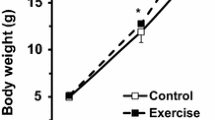Abstract
The relationship between body size and the depletion of white muscle metabolites (e.g., PCr, ATP, glucose and glycogen) was examined in two sizes (30 or 700 g) of rainbow trout deprived of food for one, four or seven days at either 5 or 15 °C. Following 7 days of food deprivation at 15 °C, the levels of muscle glycogen decreased by approximately 50% in small fish relative to control values (i.e., day 1). In comparison, small fish acclimated to cold temperatures did not exhibit a significant reduction of muscle glycogen over the seven day fasting regime. In contrast to small fish, the levels of white muscle glycogen in large fish remained unchanged after food deprivation, regardless of acclimation temperature. A seven day deprivation of food also resulted in a 50% depletion of white muscle glucose concentrations in small and large fish acclimated to warm temperatures, but there were no significant changes in this variable in fish acclimated to cold temperatures. In contrast to the negative effects of food deprivation on white muscle glycogen and glucose levels, the concentrations of white muscle PCr and ATP were not greatly affected by food deprivation under any of the experimental conditions. Taken together, these results clearly show that food deprivation can have an important influence on the storage of energy metabolites for anaerobic energy production, particularly in small fish at warm temperatures. In the future, it may be very important to consider the physiological effects of short-term food deprivation when interpreting results from studies in which fish have been fasted prior to treatments such as exercise.
Similar content being viewed by others
References
Dobson, G.P. and Hochachka, P.W. 1987. Role of glycolysis in adenylate depletion and repletion during work and recovery in teleost white muscle. J. Exp. Biol. 129: 125-140.
Ferguson, R.A., Kieffer, J.D. and Tufts, B.L. 1993. The effects of body size on the acid-base and metabolite status in the white muscle of rainbow trout before and after exhaustive exercise. J. Exp. Biol. 180: 195-207.
Fry, F.E.J. 1971. The effect of environmental factors on the physiology of fish. In Fish Physiology. Vol. VI, pp. 1-98. Edited by W.S. Hoar and D.J. Randall. Academic Press, New York.
Goolish, E.M. 1989. The scaling of aerobic and anaerobic muscle power in rainbow trout (Salmo gairdneri). J. Exp. Biol. 147: 493-505.
Goolish, E.M. 1991. Aerobic and anaerobic scaling in fish. Biol. Rev. 66: 33-56.
Grove, D.J., Loizides, L.G. and J. Nott 1978. Satiation amount, frequency of feeding and gastric emptying rate in Salmo gairdneri. J. Fish Biol. 12: 507-516.
Hassid, W.Z. and Abraham, S. (1957). Chemical procedures for analysis of polysaccharides. In Methods in Enzymology. pp. 34-37. Academic Press, New York.
Kaufmann, R. and Wieser, W. 1992. Influence of temperature and ambient oxygen on the swimming energetics of cyprinid larvae and juveniles. Environ. Biol. Fish. 33: 87-95.
Kieffer, J.D., Currie, S. and Tufts, B.L. 1994. Effects of environmental temperature on the metabolic and acid-base responses of rainbow trout to exhaustive exercise. J. Exp. Biol. 194: 299-317.
Kieffer, J.D., Ferguson, R.A. Tompa, J.E. and Tufts, B.L. 1996. Relationship between body size and anaerobic metabolism in brook trout and largemouth bass. Trans. Am. Fish Soc. 125: 760-767.
Mehner, T. and Wieser, W. 1994. Energetics and metabolic correlates of starvation in juvenile perch (Perca fluviatilis). J. Fish Biol. 45: 325-333.
Mommsen, T.P. and Hochachka, P.W. 1988. The purine nucleotide cycle as two temporally separated metabolic units: a study on trout muscle. Metabolism 37: 552-556.
Moyes, C.D. and West, T.G. 1995. Exercise metabolism. In Fish Biochemistry and Molecular Biology of Fishes. Vol. 4. pp. 367-392. Edited by P.W. Hochachka and T.P. Mommsen Elsevier Press, New York.
Navarro, I. and Gutierrez, J. 1995. Fasting and starvation. In Fish Biochemistry and Molecular Biology of Fishes. Vol. 4. pp. 393-434. Edited by P.W. Hochachka and T.P. Mommsen Elsevier Press, New York.
Prosser, C.L. 1991. Temperature. In Environmental and Metabolic Animal Physiology. pp. 109-166. Edited by C.L. Prosser. Wiley-Liss, New York.
Scarabello, M., Wood, C.M. and Heigenhauser, G.J.F. 1991. Glycogen depletion in juvenile rainbow trout as an experimental test of the oxygen debt hypothesis. Can. J. Zool. 69: 2562-2568.
Schmidt-Nielsen, K. 1984. Scaling: Why is Animal Size so Important? Cambridge University Press, Cambridge.
Sherstneva, T.A. and Shabalina, A.A. 1971. Some aspects of carbohydrate-lipid metabolism in rainbow trout [Salmo irideus (Gibb.)] following lengthy starvation. J. Ichthyol. 13: 576-582.
Tang, Y. and Boutilier, R.G. 1991. White muscle intracellular acidbase status and lactate status following exhaustive exercise: a comparison between freshwater-and seawater-adapted rainbow trout (Salmo gairdneri). J. Exp. Biol. 141: 407-418.
Author information
Authors and Affiliations
Rights and permissions
About this article
Cite this article
Kieffer, J., Tufts, B. Effects of food deprivation on white muscle energy reserves in rainbow trout (Oncorhynchus mykiss): the relationships with body size and temperature. Fish Physiology and Biochemistry 19, 239–245 (1998). https://doi.org/10.1023/A:1007759407275
Issue Date:
DOI: https://doi.org/10.1023/A:1007759407275




